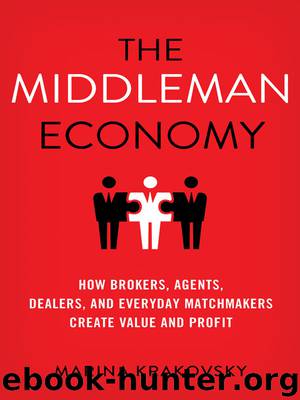The Middleman Economy: How Brokers, Agents, Dealers, and Everyday Matchmakers Create Value and Profit by Marina Krakovsky

Author:Marina Krakovsky [Krakovsky, Marina]
Language: eng
Format: epub
Publisher: Palgrave Macmillan
Published: 0101-01-01T00:00:00+00:00
The Promise and the Perils of Sharing Risk
* * *
It is a general principle that when the party that’s best able to bear the risk does so, both parties are better off. The middleman who is able to bear risk can profit from doing so by charging a risk premium, while the more risk-averse party doesn’t mind paying the risk premium to reduce risk. So why don’t we see middlemen bearing most of the risk?
The answer to this risk-sharing question goes back to the old problems of adverse selection and moral hazard. Most economic outcomes in the world are some combination of effort and chance (or skill and luck). How many widgets a sales rep sells, for example, depends on how hard the rep works, how good the rep is at sales to begin with, and factors completely outside the rep’s control, from the quality of the widget to the state of the economy. The rep shouldn’t be held responsible for those external risks, and the company she works for (which has many reps) is in a better position to bear the risk. So should the company pay all sales reps a fixed wage, no matter how many widgets they sell? It’s a difficult question, and based on a host of factors we see either hourly workers or commissioned salespeople18 in successful firms, but often a fixed-pay scheme can disproportionately attract lousy salespeople (adverse selection causing better salespeople to prefer pay-for-performance employers) and may induce even the skilled ones to slack off (moral hazard). In general, the more risk one party assumes, the less incentive the other party will have to work hard. So there’s a tension: on the one hand, both parties stand to benefit from sharing risk; on the other hand, sharing risk changes incentives and increases risk. Economists are very familiar with this trade-off between risk sharing and incentives, which occurs in many contexts and not just in sales.19 Successful middlemen, whose livelihood depends on sharing risk and providing proper incentives to buyers and sellers, also understand the problem. But judging by how ordinary people evaluate the decisions middlemen make, it seems that many of us don’t quite get it. Consider the following cases:
•A single mother struggling to keep up with mortgage payments on her condo tries to refinance, but the lender rejects her application because she had recently lost her job, which is the very reason she is struggling.20 On the other hand, Mark Zuckerberg refinances the loan on his $5.95 million mansion and gets an interest rate of 1.05 percent, less than half the national average.21
•A 50-year-old man gets advanced-stage prostate cancer, begins aggressive treatment, and applies for life insurance to protect his family if the worst case should happen. The insurance company turns him down, telling him he can apply again in 12 months.22 Meanwhile, the same insurance company advertises to young families, eager to sell them policies with low monthly premiums.
•An aspiring children’s book author who’s never been published before wants to reach
Download
This site does not store any files on its server. We only index and link to content provided by other sites. Please contact the content providers to delete copyright contents if any and email us, we'll remove relevant links or contents immediately.
| Bookkeeping | Business Mathematics |
| Business Writing | Communications |
| Decision Making | Negotiating |
| Project Management | Running Meetings & Presentations |
| Secretarial Aids & Training | Time Management |
| Training |
Nudge - Improving Decisions about Health, Wealth, and Happiness by Thaler Sunstein(6679)
Deep Work by Cal Newport(5566)
Principles: Life and Work by Ray Dalio(5368)
The Doodle Revolution by Sunni Brown(4077)
Factfulness: Ten Reasons We're Wrong About the World – and Why Things Are Better Than You Think by Hans Rosling(4052)
Thinking in Bets by Annie Duke(3562)
Eat That Frog! by Brian Tracy(3559)
Writing Your Dissertation in Fifteen Minutes a Day by Joan Bolker(3316)
Hyperfocus by Chris Bailey(3312)
Visual Intelligence by Amy E. Herman(3301)
How to Win Friends and Influence People in the Digital Age by Dale Carnegie & Associates(2859)
How to win friends and influence people by Dale Carnegie(2855)
Schaum's Quick Guide to Writing Great Short Stories by Margaret Lucke(2827)
Hidden Persuasion: 33 psychological influence techniques in advertising by Marc Andrews & Matthijs van Leeuwen & Rick van Baaren(2812)
The Pixar Touch by David A. Price(2762)
Ogilvy on Advertising by David Ogilvy(2723)
The Slow Fix: Solve Problems, Work Smarter, and Live Better In a World Addicted to Speed by Carl Honore(2592)
Work Clean by Dan Charnas(2579)
The Content Trap by Bharat Anand(2511)
